






Managing Editor
Sarath Shyam
Consultant Editors
Dr. John Andrews
Emma James
Andrew Scott
Naomi Wilson
Stanly Lui
Joseph Alex
Creative Consultants
Charlie Jameson
Edwards Gonzalez
Branding & Marketing Partnerships
Jennifer Anderson
Alice Smith Lucy Jones Anna Elza
Enquiry
admin@highereducationdigest.com

International
4 Higher Education Digest April 2024
Partnerships Europe 27, Old Gloucester Street, London, WC1N 3AX, UK
Asia-Pacific Ramanashree Arcade, 18 MG Road, Bangalore – 560001, India
Higher Education Digest is a digital magazine published by Connecta Innovation Private Limited. All rights reserved. The opinions expressed in the content and pictures provided are those of the authors. They do not purport to reflect the opinions or views of the Connecta Innovation Private Limited or any of its members and we do not assume any responsibility. The publisher does not assume any responsibility for the advertisements, its content, pictures, and all representation of warranties made in such advertisements are those of the advertisers and not of the publisher. Higher Education Digest is a Free Subscription digital magazine strictly not for sale and has to be strictly for internal private use only. Publisher does not assume any responsibility arising out of anyone printing copy of this digital magazine in any format and in any country and all matters related to that. Free Subscription April 2024 Vol - 6 Issue - 4 admin@highereducationdigest.com
Middle East & Africa P.O. Box 48299, Dubai Silicon Oasis, Dubai, UAE Americas 16192 Coastal Highway, Lewes, DE 19958, USA
Unleashing the Power of Digital Innovation: Transforming Education and Shaping the Future
Universities need to make digital innovation a top priority. Why? Because it can completely transform education in many ways. First off, using digital tech can make learning easier and more fun. Things that used to seem complicated can become clear and interesting with tools like virtual reality, augmented reality, and gamification. These kinds of tools can cater to different ways people learn, getting students ready for whatever jobs they’ll have in the future.
And it’s not just about making things easier for students. Embracing digital tech can also help universities run more smoothly and save money. By automating tasks and using digital resources, schools can free up resources for other important stuff. Plus, digital tools can help researchers do more advanced work, like analyzing data and collaborating across different fields. This kind of innovation can inspire everyone at the university to think outside the box and come up with solutions to real problems.
So, focusing on digital innovation isn’t just good for education – it can also make
a big difference in society as a whole. By using technology in smart ways, universities can help make the world a better place.
In this edition of Higher Education Digest Magazine, check out the SMU Lyle School of Engineering. They’re leading the way in digital innovation for 2024, pushing boundaries in Dallas, Texas, to create an amazing new learning experience for future engineers.
We’re also shining a spotlight on the School of Business at Alcorn State University and the Naveen Jindal School of Management as standout business schools in the US & Canada for 2024. These schools are set to shake things up on the global stage, offering students a diverse range of opportunities to pursue their dreams.
And don’t miss our op-ed articles, where we dive into the latest trends in higher education. From digital transformation to sustainability and diversity, these articles will get you thinking and inspire you to keep pushing for positive change.
Enjoy Reading.
 Sarath Shyam
Sarath Shyam
5 Higher Education Digest April 2024
MANAGING EDITOR’S NOTE
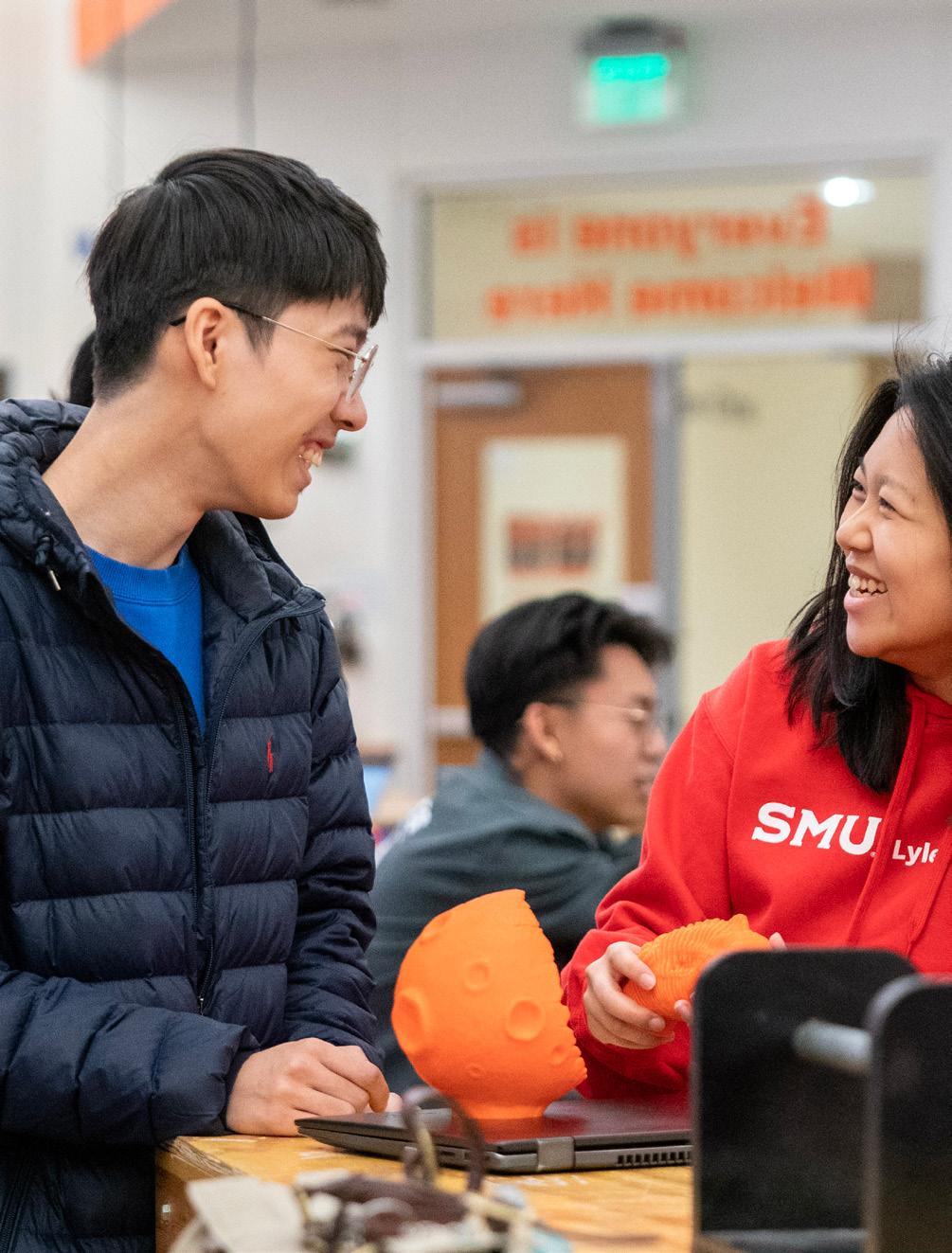

Higher Education Digest April 2024 CONTENTS CONTENTS SMU’s
COVER STORY UNIVERSITY LEADING IN DIGITAL INNOVATION 2024 MUST-WATCH
LYLE SCHOOL OF ENGINEERING LEADING DIGITAL INNOVATION TO EMPOWER FUTURE RESILIENT ENGINEERING WORKFORCE



7 Higher Education Digest April 2024 ALCORN SCHOOL OF BUSINESS Making Tomorrow’s Leaders Today 34 NAVEEN JINDAL SCHOOL OF MANAGEMENT Transforming Aspirations into Achievements 60


Higher Education Digest April 2024 CONTENTS CONTENTS 70 UNLEASHING THE POTENTIAL OF EDUCATIONAL TEAMS: THE ART OF COACHING Dr. Caroline Holden, Owner of Caroline Holden Consultancy Ltd INDUSTRY PERSPECTIVE 24 HELPING TRANSFORMATIVE EDTECH COMPANIES SCALE & STAY AHEAD OF THE CURVE Tory Patterson, Co-founder and Managing Director, Owl Ventures MENTOR’S MANTRA
ACADEMIC VIEW
INCLUSION OF HEALTH LITERACY CONTENT AND ASSESSMENTS IN HEALTHCARE COURSES
Joyvina Evans, PhD, Assistant Professor at Howard University in Washington D.C.


FROM TRADITION TO TRANSFORMATION: RETHINKING CAREER SERVICES IN HIGHER EDUCATION
Dr. A.J. Merlino, Associate Vice President of Student Professional Development & Experiential Learning, Harrisburg University

Higher Education Digest April 2024
50
74 54

SMU’s
LYLE SCHOOL OF ENGINEERING LEADING DIGITAL INNOVATION TO EMPOWER FUTURE RESILIENT
WORKFORCE
ENGINEERING
Education COVER STORY

April 2024 C O V E R S T O R Y UNIVERSITY LEADING IN DIGITAL INNOVATION 2024 MUST-WATCH
SMU’s Lyle School of Engineering in Dallas, Texas, is on the cusp of an extraordinary new era.
Over the past year, the school has undertaken a journey toward transforming into a world-class, researchfocused and student-centric educational experience for future engineers.
Through digital innovation and modular paradigm in both teaching and research, the school is not just shaping the future; it is molding the future of engineering. Our goal is to produce future engineers who will not only excel as a resilient workforce but also emerge as innovative and forwardthinking leaders in their respective fields.
“Technologies like artificial intelligence in all modes of learning including narrative, collaborative and equitable, augmented and mixed reality, data science and quantum computing are fundamentally reshaping the way engineers work,” said Nadar Jalili, Mary and Richard Templeton Dean of SMU Lyle. “Lyle is at the forefront of this transformation.”
From pioneering a brand-new Center for Digital and Human-Augmented Manufacturing to serving a pivotal role in

Nader Jalili
Mary and Richard Templeton Dean, SMU Lyle School of Engineering
At SMU Lyle, the undergraduate engineering curriculum is designed with a blend of traditional credit-bearing coursework and non-traditional projectbased modular learning experiences, ensuring that graduates emerge as highly proficient individuals ready to tackle real-world challenges
12 Higher Education Digest April 2024
the SMU-led Texoma Tech Hub that will unify the semiconductor supply chain, SMU Lyle is poised to provide an education that prepares students for the challenges of today and equips them with the skills and knowledge to excel in the engineering world of tomorrow.
Pioneering Digital Manufacturing
When Dean Jalili joined SMU in the spring of 2023, he realized SMU Lyle needed more room for growth with traditional and experimental manufacturing. Previously, he led the creation of the Alabama Initiative on Manufacturing Development and Education at the University of Alabama, designed to better prepare future highly skilled workers and guide research on automation, human-robot collaboration and augmentation.
He envisioned a new center uniquely positioned for research innovation that integrated digital modeling, simulations, augmented/mixed reality, robotics, automation, and artificial intelligence in manufacturing processes, and that leveraged collaboration with industry partners in the Dallas-Fort Worth area. It would also benefit from the
computational research power of one of the top high-performance computing clusters in the Southeast.
“Instead of investing in million-dollar equipment, we’re utilizing our highperformance computing power to create the most sophisticated virtual version, which is this digital twin concept,” Dean Jalili said. “You would build a digital model in virtual reality with interactive and continuous connections with the physical plant, and start experimenting in your imagination. This is now becoming a trend in many industries –aerospace, manufacturing, healthcare and finance, to just name a few.”
The new Center for Digital and HumanAugmented Manufacturing, spanning 5,000 square feet and slated to open in April, will serve as a nexus for students, researchers, and industry partners to explore the evolving realms of engineering and Industry 4.0+.
“Through digital transformation and innovation, we are preparing both Lyle and the Dallas-Fort Worth tech landscape for the future,” Dean Jalili said.

13 Education April 2024

The Center for Digital and HumanAugmented Manufacturing is part of SMU Lyle’s broader vision for digital innovation, which includes:
Cultivating Innovation in Research and Transformative Industry Partnerships: The new center will serve as a beacon for innovation, empowering students and researchers to drive transformative advancements in engineering.
Empowering Student Leadership and Enriching Learning Environments: Through digital twin initiatives and engagement with industry partners, students will have unique opportunities to cultivate essential leadership skills and connect with the business community.
Leading Digital Innovation in Education and Research: SMU Lyle’s innovative approach, including the LyleAnywhere™ platform,
14 Higher Education Digest April 2024

provides students with flexible learning options tailored to diverse needs and circumstances, ensuring a dynamic and inclusive educational experience.
“Our commitment to digital innovation extends beyond the classroom, empowering students to thrive in an ever-evolving technological landscape, being able to become their more agile and resilient version “ Dean Jalili said.
Leading Semiconductor Innovation
SMU has been designated the lead agency for a federally funded economic development initiative to strengthen, build on and drive innovation in the existing semiconductor supply chain in 29 counties in North Texas and Oklahoma through regional collaboration and workforce development.
The initiative, announced by The White House and the U.S. Department of Commerce in October 2023, is designed to develop and grow innovative industries in regions across the country. The SMU-led Texoma Semiconductor Hub, one of 31 announced across the country, is the only hub designated in Texas and includes a consortium of members from private industry,
From advancing AI capabilities to improving infrastructure inequities in low-income neighborhoods, researchers at SMU Lyle are at the forefront of diverse and groundbreaking projects
15 Higher Education Digest April 2024
Lyle’s Career Services offers a comprehensive range of programs and services focused on career exploration and professional development for students at all levels
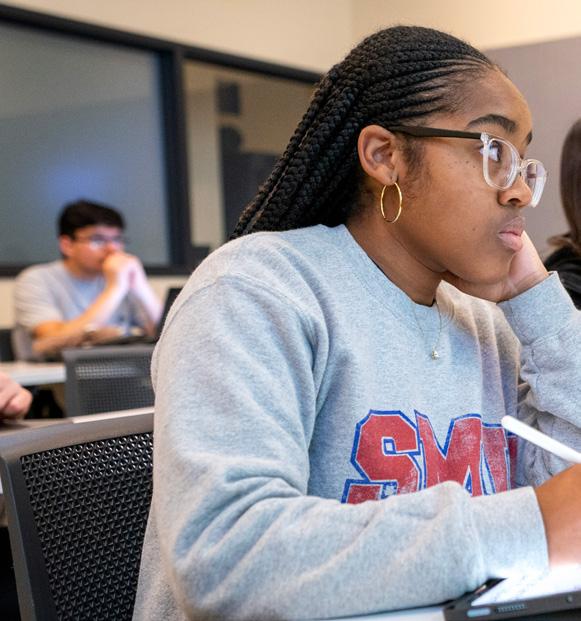
local governments, colleges and universities, tribal communities and nonprofit organizations.
The 41- member Texoma Semiconductor Innovation Consortium is eligible to compete for up to $75 million in funding through The CHIPS and Science Act, signed into law in August 2022. The consortium now begins the planning and development phase to build the model to promote enhanced collaboration, expand the region’s technical workforce and catalyze the commercialization of technological advancements through the development of: “Fablets” – sophisticated, targeted and accessible labs with equipment for electronic design, semiconductor manufacturing, packaging and/or testing throughout the region, specifically addressing the needs in underserved areas.
Commercialization Councils link innovators, venture capitalists and industry representatives throughout the supply chain to commercialize and manufacture new ideas and products.
Workforce Development Councils promote opportunities at multiple skill levels for students and adult learners to enter the workforce, acquire new knowledge and obtain advanced degrees and certifications while minimizing the time it takes to do so. The outreach education will begin at the K-12 level while adult learners can find a pathway to advance their careers in semiconductor industry.
Under the leadership of the SMU Office of Research and Innovation, the Tech Hub consortium was organized by Dr. Jennifer Dworak, Dr. Scott Douglas, and Dr. J.-C. Chiao,
16 Higher Education Digest April 2024

professors in the SMU Lyle School’s Department of Electrical and Computer Engineering. The consortium’s goal is to support national security and impact many industries directly, including the automobile, energy, healthcare and communications industries.
Mastering the Next Quantum Revolution
A new Master of Science in Quantum Engineering program offered at SMU Lyle delves deep into the realms of quantum informatics and engineering, empowering students to innovate and refine advanced processes, systems, and devices. This comprehensive program exposes students to a myriad of quantum engineering domains, ranging from sensing and computation to communications and customized systems. By embracing both established principles and emerging technologies, students are equipped to thrive in a rapidly evolving landscape.

April 2024
17
At SMU Lyle, the undergraduate engineering curriculum is designed with a blend of traditional credit-bearing coursework and non-traditional project-based modular learning experiences, ensuring that graduates emerge as highly proficient individuals ready to tackle real-world challenges. By integrating opportunities from various centers and institutes into the curriculum, such as the Hart Center for Engineering Leadership, the Hart Institute for Technology, Innovation and Entrepreneurship, the Deason Innovation Gym, and the Hunt Institute for Engineering and Humanity, students are not only equipped with technical prowess but also imbued with innovation, mentorship, leadership, and entrepreneurship skills. Our differentiating signature lies in our resilient engineering workforce, characterized by lifelong learners and forward-thinking leaders.
Throughout their undergraduate journey, students at SMU Lyle engage with worldrenowned scholars and industry leaders who bring with them a wealth of teaching and research experiences from esteemed institutions like MIT, Berkeley, Cambridge, Brown, and the University of Texas at Austin. This close interaction fosters a culture of communication and accessibility between faculty and students, ensuring personalized attention and maximizing learning experiences. With a remarkable graduate studentto-faculty ratio of 9:1, SMU Lyle cultivates enduring relationships between students and instructors, facilitating a conducive environment for academic growth and development.
“Our commitment to nurturing well-rounded engineers extends beyond the classroom, ensuring that every student receives personalized

18 Education
To provide an inclusive and supportive environment at SMU Lyle, the Thrive Scholars peer-mentoring program was formulated to offer academic and social support to first-year and transfer students who are traditionally underrepresented in engineering and computer science fields
attention and guidance to excel in their chosen field,” Dean Jalili said.
Fostering Cutting-Edge Research
From advancing AI capabilities to improving infrastructure inequities in low-income neighborhoods, researchers at SMU Lyle are at the forefront of diverse and groundbreaking projects.
Focus areas include:
AI and machine learning: Dr. Digvijay Boob leads efforts to advance AI capabilities, focusing on enhancing machine learning efficiency to promote fairness in algorithms, optimize inventory management, and improve decisionmaking processes in power plant control. Dr. Jia Zhang collaborates with NASA on MATA, an intelligent assistant for Earth science research. Dr. Corey Clark addresses bias in facial recognition
technology by generating synthetic datasets to tackle fairness issues and ethical concerns.
Data and cybersecurity: Dr. Klyne Smith’s expertise lies in datacenter systems, where he contributes insights into cybersecurity challenges posed by quantum computers and explores potential military applications for quantum-safe communication technology.
Biomedical and human health: Dr. Janille Smith-Colin investigates the impact of transportation improvements on health outcomes for vulnerable populations, while Dr. J.-C. Chiao explores medical applications of electromagnetic waves, particularly in pain management and gastric motility. Additionally, Ph.D. student Khengdauliu Chawang developed a miniature pH sensor
19 Higher Education Digest April 2024
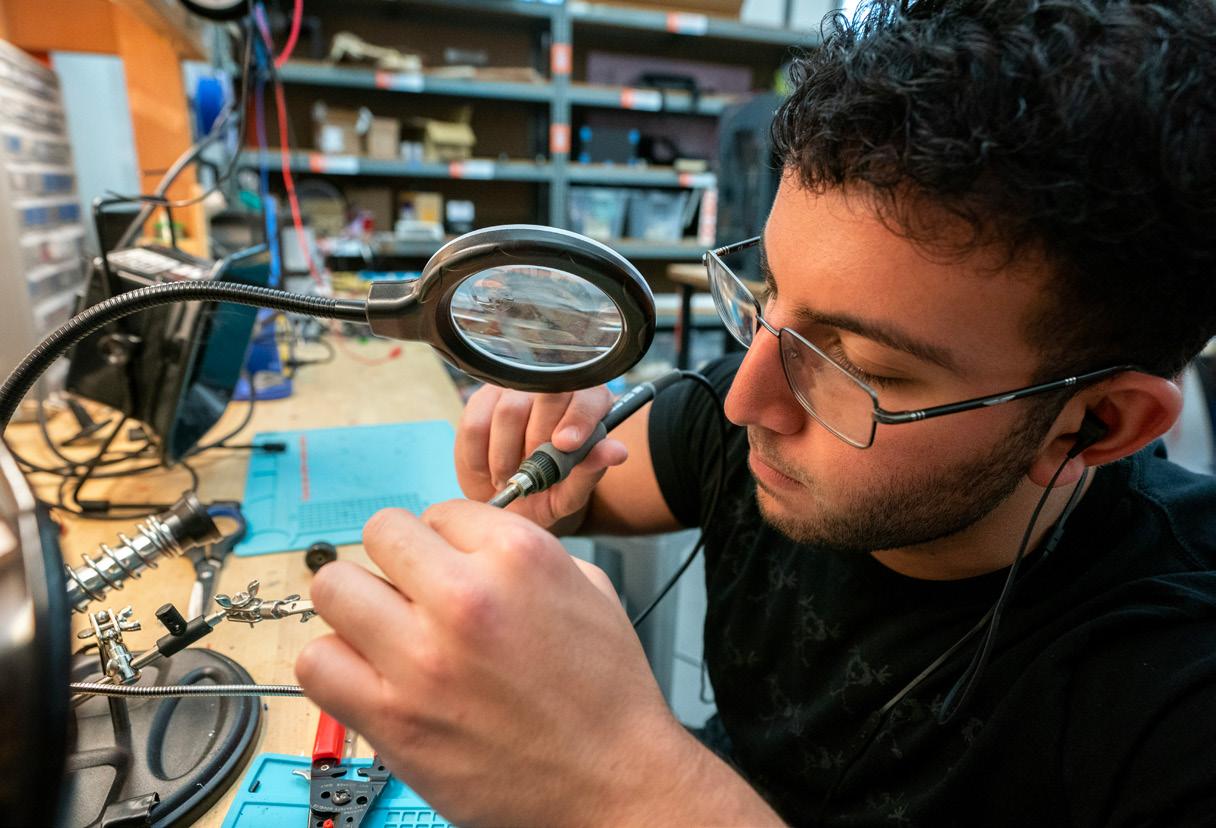
SMU Lyle’s innovative approach, including the LyleAnywhere™ platform, provides students with flexible learning options tailored to diverse needs and circumstances, ensuring a dynamic and inclusive educational experience
for real-time monitoring of food freshness. Dr. MinJun Kim contributed to a costeffective method for detecting nuclease digestion, crucial for applications like COVID-19 testing.
Infrastructure equity: Dr. Barbara Minsker developed an Infrastructure Dashboard Prototype to identify areas lacking essential infrastructure in Dallas, aiding scientists, policymakers, and residents in enhancing neighborhood
20 Higher Education Digest April 2024
conditions. Dr. Khaled Abdelghany is working on PANORAMA, an AI-based program to improve intersection safety and efficiency nationwide.
Responsible mining: Dr. Kate Smits examined mercury emission estimates worldwide, emphasizing the need for comprehensive reporting to facilitate effective reduction efforts under the Minamata Convention.
These diverse projects epitomize the innovative research happening at SMU Lyle, addressing critical challenges across various fields with the aim of creating a positive impact on society.
“Our commitment to fostering cuttingedge research not only propels academic excellence but also drives innovation and societal advancement,” Dean Jalili said.
Empowering Future Engineers
The Hart Center for Engineering Leadership at SMU Lyle integrates elite technical education with exceptional leadership and professional development skills, nurturing world-changing engineers. With a focus on leveraging DallasFort Worth’s thriving business environment, the center provides students with the necessary foundation to cultivate leadership skills and achieve their professional aspirations.
“With expert guidance from the Hart Center team, Lyle students are engineered to lead and programmed to succeed,” Dean Jalili said.
The Darwin Deason Institute for Cyber Security drives advancements in cyber security through problem-driven, interdisciplinary research open to student participation. Committed to emerging as a world-class research center,

21 Higher Education Digest April 2024
the Institute innovates, develops, and delivers solutions to the nation’s most challenging cyber security problems.
The Hunt Institute for Engineering & Humanity is dedicated to developing and scaling sustainable and affordable technologies and solutions to address challenges in all communities. Serving as a hub for collaboration among business, academia, and governmental organizations, the institute fosters market-based sustainable mechanisms to create equitable and inclusive opportunities worldwide.
Lyle’s Career Services offers a comprehensive range of programs and services focused on career exploration and professional development for students at all levels. Unique networking opportunities, such as Mock Interview Day and the Engineering
Connections Career Fair, equip Lyle students with the tools needed for success in the workforce.
The SMU Lyle Summer Undergraduate Research Fellowship Program provides students with hands-on research experience alongside faculty members, preparing them for graduate school or careers in engineering research.
“These initiatives underscore SMU Lyle’s commitment to empowering students with the resources and support needed to excel in their academic and professional pursuits,” Dean Jalili said.
Ensuring All Students Thrive
To provide an inclusive and supportive environment at SMU Lyle, the Thrive Scholars peer-mentoring program was formulated to offer academic and social support to first-year and transfer students who are traditionally

Education 22
underrepresented in engineering and computer science fields. Through one-on-one support from upper-class peer mentors, mentees receive guidance and assistance during their initial year at SMU.
The program, which sets a profound example of what peer mentorship should be across university campuses, has grown by roughly 150% over the past two years.
“The Thrive Scholars Program embodies our commitment to fostering diversity and inclusion within the engineering community, ensuring that all students have the resources they need to succeed,” Dean Jalili said.
Student clubs and organizations also play a vital role in enhancing diversity, equity, and inclusion capabilities at Lyle. With over 22 engineering student organizations, including the National Society of Black Engineers, Society of
Hispanic Professional Engineers, and Society of Women Engineers, students have ample opportunities for involvement and support.
The Lyle Industry Mentorship Program and the Lyle Undergraduate Advising and Academic Support Program further connect students to mentors, tutors, and other resources.
Cultivating Engineering Leaders
At SMU Lyle, every student is empowered to create innovative solutions to change the world.
Our goal is to provide leadership training for every student. Employers consistently highlight the readiness of Lyle graduates to engage with customers and lead teams early in their careers. It’s a testament to our commitment to cultivating leadership skills from day one.
Through personalized leadership assessments, one-on-one mentorship, and immersive entrepreneurial experiences, every student at Lyle is afforded the opportunity to develop the leadership skills that are essential for their success.
At SMU Lyle, every student is empowered to create innovative solutions to change the world
“The Lyle School of Engineering has unmatched potential to lead superior quality research and education programs as well as to prepare students to become leaders and innovators in solving the rapidly challenging problems of the 21st century,” Dean Jalili said. “We are advancing our institution to become one of the most innovative engineering schools, known for producing engineers who are agile, resilient, technically strong, multidisciplinary and capable of innovations to lead and develop solutions to meet society’s needs.”
23 Higher Education Digest April 2024

MENTOR’S
Helping Transformative EdTech Companies Scale & Stay Ahead of the Curve
Tory Patterson, Co-founder and Managing Director, Owl Ventures
Tory Patterson is a co-founder and Managing Director of Owl Ventures, the largest venture capital firm in the world focused on the education technology market with over $2 billion in assets under management. He currently serves on the board of directors for over a dozen leading edtech companies. As one of the early pioneers in the next generation of leading EdTech companies, Tory has led investments in some of the most successful companies in the sector. Tory is a Pahara-Aspen Education Fellow and an Edmund Hilary Global Impact Fellow. He holds a B.A. in Economics from Williams College and an M.B.A. from the Stanford Graduate School of Business.
Recently,inanexclusiveinterviewwithHigherEducation Digest, Tory shared the inspiration behind establishing Owl Ventures, the three key things that he looks for when evaluating new opportunities, his predictions for Edtech in the next decade, future plans, and much more. The following excerpts are taken from the interview.
Higher Education
MANTRA
We love young companies that have a different mindset about innovation and want to over-deliver a new experience to customers in these categories
Tory, can you please tell us about your areas of interest and what is driving you today?
As a father of four school-aged children, I have a keen awareness of the challenges and opportunities today’s students are facing in (and out of) the classroom. Students are growing up in a world that has evolved dramatically since their parents were in school. The technology landscape alone has revolutionized our planet in the last forty years perhaps more than any forty-year period in recorded human history. Remember - the internet was merely a theoretical test space when parents today were in school, now it defines every industry on earth. The dramatic arrival of consumer facing artificial intelligence has the potential to further accelerate the pace of change that today’s students are going to need to adapt to as they
enter the workforce and life after school. All this evolution shines a bright spotlight on the question of “for what” and “how” should we be preparing today’s youth for their future.
What was the inspiration behind establishing Owl Ventures and why did you choose the EdTech industry?
My early career prepared me extremely well for launching and scaling Owl Ventures as the largest and preeminent global venture capital fund focused on education technology. I graduated from Williams College with a major in economics and began my career as technologyfocused investment banker in San Francisco. I then attended the Graduate School of Business at Stanford University where I spent my studies focused on the venture capital industry and joined a fast-growing VC fund upon graduation.
25 Higher Education Digest April 2024
The early 2000s was a fascinating time in the technology VC landscape with the industry recovering from the big crash of 2000 and the march of technological innovation steadily continuing. There were obvious new frontiers where the power of web-based content solutions could bring massive efficiency and gains to industries that had been slow to adopt technology-based solutions. The capability of the internet to massively improve the experience of students was obvious, but there were significant roadblocks to adoption which
had left the education space behind – perhaps decades behind other global industries. By 2008 the dam was beginning to break, and broadband adoption rates were climbing at schools (helped by US government subsidies) and the opportunity to deliver the value proposition to students was accelerating – the time for the education sector to integrate with the power of the internet had finally come.
My first investment was into a company called Presence which had been launched by two unbelievably ambitious and brilliant co-

In the coming decade there will be well over a dozen high growth and very profitable public companies that dominate the next chapter of education content and product
founders. I subsequently invested in a series of education technology companies that all made a big splash in terms of adoption rates and student achievement gains at a time when broadband penetration rates in US schools was still nascent. This was the beginning of an edtech boom that grew steadily and has never looked back.
My partners and I launched Owl Ventures to create an organization that would serve as an institution of excellence for scaling the world’s most promising and elite education technology companies. The sector was growing rapidly and there were no firms that were designed from inception to professionally support the sector. We were fortunate to partner with the world’s elite institutions that were working in the trenches to support students globally including the Bill & Melinda Gates Foundation as founding limited partners. Fast forward ten years, and today Owl Ventures manages approximately $2.5 billion and is working with about 100 companies around the world that are accelerating student outcomes and delivering upon the promise of technology’s ability to improve education. Our
work is in the early innings in terms of where this movement will go over the coming decades.
As an investor, what are the three key things that you look for while investing in a company?
I am looking for three major elements when evaluating new opportunities.
a.People first. I am particularly focused on the individual I will be partnering with when we embark on a new investment and partnership. We are looking for leaders that have a burning passion for the problem they are solving. In the same way we are coaching students to adopt a growth mindset, I am looking for CEOs that have the same approach to their own development. A company journey is long and will evolve tremendously – we need leaders that are committed to their own evolution as their organizations scale.
b.Markets second. We love large markets that are dominated by stale incumbent providers. As companies dominate their categories there is a tendency towards complacency and
27 Higher Education Digest April 2024
I believe my life’s purpose is to do everything in my power to accelerate the market for learning technology
subsequently an under-investment in innovation and R&D. We love young companies that have a different mindset about innovation and want to overdeliver a new experience to customers in these categories.
c.Innovation third. When we say yes to a new investment it is almost always a byproduct of an innovation “Aha moment” or efficiency unlock that no other competitor can achieve. We are leaning into these innovation moments and looking to leverage that advantage as an entry point to begin scaling a new powerhouse company.
How important do you think it is to make an impact as an entrepreneur and investor, especially in the EdTech industry?
I’m often asked about making an impact and how I approach that concept as an investor and professional. My short answer is that I can’t imagine living an inspired life without a clear focus on improving the state of humanity’s lived experience. I believe that improving the efficiency, relevance, reach and enjoyment of education is one of the most important levers we can pull to improve humanity. I believe deeply that all the problems we wrestle with globally map back to inequity in education quality and access and that these are very solvable problems – especially if we leverage the superpowers of technology. Our firm invests heavily in the measurement and reporting of the impact our portfolio companies deliver –
28 Higher Education Digest April 2024
notably in terms of access and acceleration of learning outcomes. Please check out our latest report at: https://www.owlvc. com/outcomes.php
What are your predictions for Edtech in the next 5-10 years?
Edtech is earlier in its lifecycle as a sector, as compared to other software industry verticals, but is catching up quickly. In the coming decade there will be well over a dozen high growth and very profitable public companies that dominate the next chapter of education content and product. These companies will subsequently have a public currency that will allow them to aggressively acquire emerging competitors that will create a class of powerful scaled businesses.
Today the universe of public companies with an “acquisition currency” to grow inorganically is limited which leads to stagnation in the market and longer hold times for private company investors. As the IPO window opens again, we will see several edtech companies go public and sprint to establish themselves, and subsequently lean into this acquisition flywheel that will cement their leadership and forward prospects. This dynamic exists in virtually all other software verticals and is an inevitable medium-term reality for edtech as well. There are several scaled private companies ready to bust through this IPO wall when the markets open and we will see the rise of a class of public edtech companies that energizes the entire category. This will unlock even
more capital for the sector that will fund more innovation which accrues even more value to students and institutions driving education. This high functioning flywheel is almost upon us.
What is your favorite non-academic book and why?
I am a voracious reader, so this is a hard question… I read a book when I was 13 years old that molded my mindset in powerful ways. “Ben & Jerry’s: The Inside Scoop” made a massive impression on me. These founders built their business with a mindset on impact far beyond the realm of their product – ice cream. They created customer dynamics around their product that only their values could inspire.
I highly recommend this book to anyone interested in business and finding new ways to appeal to customers and change the world!
Where do you see yourself in the next 5 years?
I am 44 years old today and as I turn 50, I expect to be doing exactly what I am doing today only with the wisdom of more experience! I believe my life’s purpose is to do everything in my power to accelerate the market for learning technology. If Owl Ventures can move the needle on the timeline and scale of great innovation in the education sector, I believe I will have achieved something profound. We have a long way to go, and I am in love with this journey and the universe of people who are on this mission with us.
29 Higher Education Digest April 2024

Desautels Faculty of Management, McGill University
Desautels is known for its global perspective and diverse student body, attracting students from over 80 countries.
Location: Montreal, Quebec, Canada
Website:
https://www.mcgill.ca/desautels/
Admissions:
https://www.mcgill.ca/desautels/programs/ mba-programs/mba/admissions
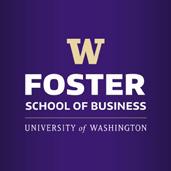
Foster School of Business, University of Washington
Foster emphasizes innovation and entrepreneurship, with initiatives like the Buerk Center for Entrepreneurship and the Jones + Foster Accelerator.
Location: Seattle, Washington, USA
Website:
https://foster.uw.edu/
Admissions:
https://foster.uw.edu/apply/
30 Higher Education Digest April 2024

McDonough School of Business, Georgetown University
McDonough is recognized for its focus on ethics and social responsibility, integrating these principles into its curriculum.
Location: Washington, D.C., USA
Website:
https://msb.georgetown.edu/
Admissions:
https://msb.georgetown.edu/apply/

Naveen Jindal School of Management, University of Texas at Dallas
The Naveen Jindal School of Management is known for its innovative and interdisciplinary approach to business education, offering a wide range of programs at the undergraduate, graduate, and executive levels.
Location: Richardson, Texas, USA
Website:
https://jindal.utdallas.edu/
Admissions:
https://jindal.utdallas.edu/admission-requirements/

Olin Business School, Washington University in St. Louis
Olin stands out for its focus on data analytics and experiential learning, preparing students for careers in the digital age.
Location: St. Louis, Missouri, USA
Website:
https://olin.wustl.edu/
Admissions:
https://olin.wustl.edu/admissions/

Questrom School of Business, Boston University
Questrom emphasizes innovation and social impact, offering unique programs such as the MBA+ MS in Digital Technology.
Location: Boston, Massachusetts, USA
Website:
https://www.bu.edu/questrom/
Admissions:
https://www.bu.edu/questrom/admissions/
31 Higher Education Digest April 2024

Sauder School of Business, University of British Columbia
Sauder is known for its strong focus on sustainability and social responsibility, offering specialized programs in business and sustainability.
Location: Vancouver, British Columbia, Canada
Website:
https://www.sauder.ubc.ca/
Admissions:
https://www.sauder.ubc.ca/

School of Business at Alcorn State University
The School of Business at Alcorn State University offers a comprehensive range of business programs that prepare students for success in various industries.
Location: Alcorn State, Mississippi, USA
Website:
https://www.alcorn.edu/academics/ schools-and-departments/school-of-business/
Admissions:
https://www.alcorn.edu/admissions/ admissions-requirements/
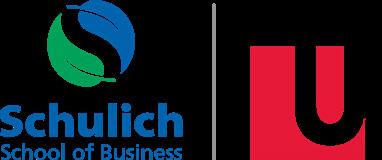
Schulich School of Business, York University
Schulich is known for its diverse range of programs, including MBA specializations in areas such as arts, media, and entertainment management.
Location: Toronto, Ontario, Canada
Website:
https://schulich.yorku.ca/
Admissions:
https://schulich.yorku.ca/admissions/

Smith School of Business, Queen’s University
Smith is recognized for its innovative curriculum and experiential learning opportunities, including the Smith Master of Management Analytics program.
Location: Kingston, Ontario, Canada
Website:
https://smith.queensu.ca/
Admissions:
https://smith.queensu.ca/
32 Higher Education Digest April 2024


ALCORN SCHOOL OF BUSINESS
Making Tomorrow ' s Leaders Today
Alcorn State University boasts a rich tradition of excellence and a profound historical legacy, having been the nation’s first public historically black landgrant institution. Today, it continues to carve pathways to success and prosperity for its students. Central to this mission is the esteemed School of Business, which holds accreditation from the prestigious Accreditation Council for Business Schools and Programs (ACBSP). This accreditation stands as a testament to the institution’s unwavering commitment to providing top-tier education and continuously enhancing students’ skills, knowledge, and leadership prowess.

34 Higher Education Digest April 2024

Alcorn School of Business has embraced a transformative approach, forging new partnerships and establishing cutting-edge centers to equip students with both theoretical knowledge and practical experience
Higher Education Digest April 2024

Dr. Antwon D. Woods, Dean of the School of Business and Associate Professor of Management, Alcorn State University
“At the Alcorn School of Business, we offer a comprehensive array of undergraduate and graduate programs, spanning disciplines such as accounting, business administration, marketing, finance, supply chain management, entrepreneurship, and data analytics,” affirms Dr. Antwon D. Woods, Dean of the School of Business and Associate Professor of Management at Alcorn State University. Emphasizing experiential learning, the programs transcend traditional teaching methods, incorporating industry-relevant case studies, dynamic classroom interactions, and real-world business challenges.
The curriculum delves deep into various facets of the business landscape, empowering students to explore diverse avenues and tailor their educational journey to align with their aspirations. Rooted in its core mission, the Alcorn School of Business is dedicated to nurturing morally upright and technically adept future leaders. These leaders are poised to drive impactful decisions and spearhead transformative changes that enhance both economic competitiveness and environmental sustainability.
“In today’s rapidly evolving business landscape, the imperative for sustainability has never been more pressing,” notes Dr. Woods.
Alcorn School of Business offers a diverse range of academic programs tailored to meet the evolving demands of the business world
Higher Education Digest April 2024
“As societal and global pressures mount, there is an urgent call to embrace sustainabilitydriven business practices. At the Alcorn School of Business, we are steadfast in our commitment to fostering the acquisition and application of such principles among our students.”
Empowering Tomorrow’s Leaders
Alcorn School of Business has embraced a transformative approach, forging new partnerships and establishing cutting-edge centers to equip students with both theoretical knowledge and practical experience. These initiatives underscore the institution’s commitment to preparing the next generation of leaders to thrive in an ever-evolving business landscape. Dr. Woods emphasizes, “We are adamant about preparing the next generation of managers, entrepreneurs, investors, and professionals to be tomorrow’s change agents.”
The school’s journey towards industry engagement began with a recognition of the need to adapt to the demands of a globalized marketplace. ASU understood that to excel in a technology-driven economy, students must
possess hands-on experience and contemporary skills. This realization sparked collaborations aimed at bridging the gap between academia and industry.
One notable partnership is with Wells Fargo, a collaboration that led to the establishment of the Wells Fargo Financial Education Center. Through this initiative, ASU offers a diverse range of courses, exposing students to the intricacies of stock investments and providing them with relevant certifications. This alliance ensures that students receive up-to-date financial education, enhancing their competitiveness in the job market.
Additionally, the new Center of Data Analytics and Informatics, which is set to open in April, will serve as a hub for cutting-edge training programs that will prepare students for careers in innovative technologies such as databases, cloud computing, and Java programming. Such knowledge not only improves their employability, but also fosters their entrepreneurial spirit, establishing them as leaders in data science and artificial intelligence.
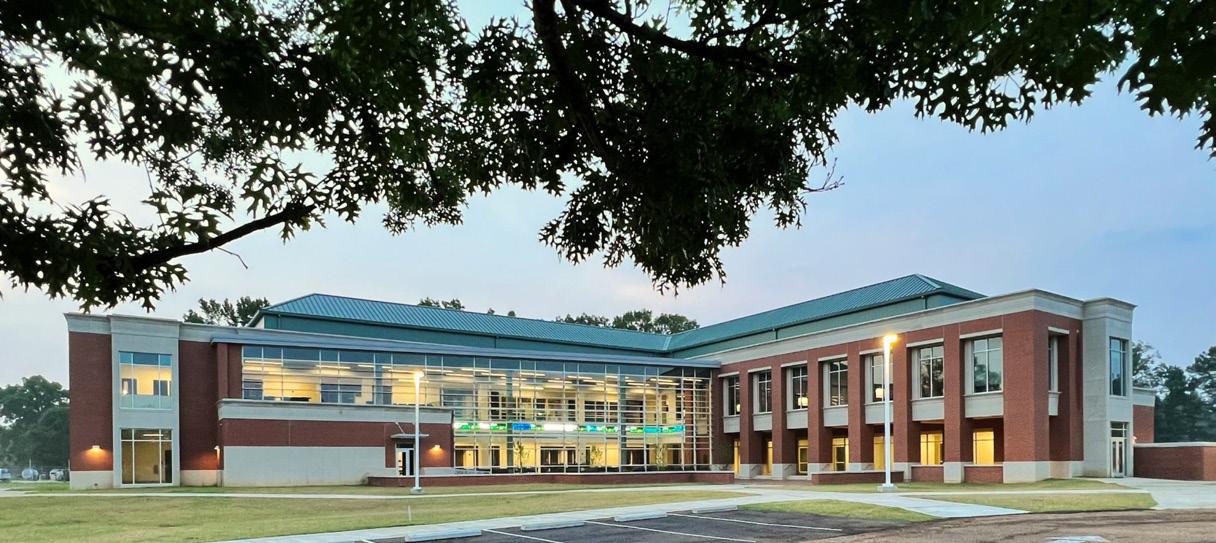
37
These partnerships and innovative measures offer unparalleled opportunities for ASU’s students, who gain hands-on experience with state-of-the-art technologies and practices. By merging practical insights with theoretical knowledge, these initiatives provide students with a competitive edge in today’s interconnected world.
Moreover, these collaborations are pivotal in shaping the future of ASU, ensuring that its
curriculum remains technologically current and relevant. Through these endeavors, ASU reaffirms its position as a leading institution in business education, committed to empowering students and driving innovation in the business sphere.
Navigating the Business Landscape of the Future
Alcorn School of Business offers a diverse range of academic programs tailored to meet

38 Higher Education Digest April 2024
Alcorn School of Business prioritizes digital literacy by incorporating courses that cultivate fluency with emerging business technologies

the evolving demands of the business world. Under the visionary leadership of Dr. Woods, the school provides students with the tools and knowledge necessary to excel in a dynamic and ever-changing environment.
At the undergraduate level, students can pursue a Bachelor of Science in Accounting or Business Administration, while those seeking advanced education can opt for the Master of Business Administration (MBA) program. Complementing these core offerings are specialized concentrations in management, data analytics, entrepreneurship, supply chain management, marketing, finance, and accounting. Dr. Woods emphasizes, “Our comprehensive business programs are designed to meet industry demands by equipping each student with the knowledge, skills, and confidence needed to succeed in an ever-changing business world.”
What sets Alcorn School of Business apart is its commitment to innovative teaching methods that transcend traditional approaches. The curriculum integrates industry-relevant case studies, interactive classroom sessions, and realworld business challenges to provide students with a holistic understanding of business operations. This experiential learning approach
39 Higher Education Digest April 2024

Alcorn School of Business is dedicated to bridging the gap between academia and the professional world, offering students a clear trajectory for their career development and job placement
allows students to experiment with various fields and discover their passion within the business sphere.
The school’s dedication to innovation is evident in its flexible and progressive curriculum, which combines practical insights, contemporary theories, and evolving technology. This ‘hybrid’ approach fosters creativity, critical thinking, and problem-solving skills among students, preparing them to thrive in the dynamic business landscape.
40 Higher Education Digest April 2024

Entrepreneurship-focused courses further underscore the institution’s commitment to nurturing risk-takers and innovators who can drive meaningful change. Dr. Woods highlights, “This dynamic learning approach enhances the learning process by merging knowledge and experience, thereby developing graduates who are adept at connecting classroom teachings to real-world scenarios.”
Moreover, Alcorn School of Business prioritizes digital literacy by incorporating
courses that cultivate fluency with emerging business technologies. This ensures that students are well-equipped to navigate the complexities of the digital age and harness its opportunities.
The curriculum also emphasizes the importance of understanding both local and global perspectives, preparing students to navigate the intricacies of domestic and international business environments. By integrating these perspectives, Alcorn School of Business ensures that students are primed to succeed in today’s interconnected world.
Fostering Excellence with a Dedicated Pool of Faculty Members
At the heart of the School of Business lies a team of dedicated faculty members who are not just educators but mentors, guiding students towards success. With a steadfast commitment to nurturing future leaders, each faculty member goes above and beyond to ensure that students are equipped to tackle real-world challenges from the moment they step into the workforce.
The faculty’s approach extends beyond traditional classroom teaching, encompassing extensive research, creative projects, and experiential learning opportunities. This holistic approach ensures that students not only acquire theoretical knowledge but also develop the practical skills and readiness required to excel in their careers.
What sets the School of Business faculty apart is their unparalleled blend of academic expertise and industry experience. Unlike the average faculty profile found in other institutions, ASU boasts a team with decades of hands-on experience in the business world prior to academia. This wealth of knowledge enriches the classroom experience, offering
41 Higher Education Digest April 2024
students invaluable insights into real-world business scenarios.
“Our faculty members are actively engaged in the business sector, contributing their expertise to scholarly journals and conferences,” shares Dr. Woods. “This ongoing involvement not only keeps them abreast of changing trends but also enables them to integrate industry insights into their curriculum, enhancing the learning experience for students.”
The faculty’s dedication to staying current with industry trends ensures that students receive a dynamic and relevant education that prepares them for the demands of the modern business landscape. Through their mentorship and expertise, the faculty of the School of Business at Alcorn State University empowers students to reach their full potential and emerge as confident, capable leaders in their respective fields.
Paving the Way for Success
Alcorn School of Business is dedicated to bridging the gap between academia and the professional world, offering students a clear trajectory for their career development and job placement. By seamlessly integrating comprehensive curriculum with realworld exposure, the school provides a platform that fosters a harmonious blend of academic learning and practical application, equipping students to thrive in the competitive job market.
Going beyond academic excellence, the School of Business offers robust career services designed to empower students on their professional journey. Through career counseling and job placement services, students are equipped with the tools and resources needed to navigate their career paths successfully. The school facilitates connections with prospective employers through job fairs and networking events, providing invaluable
Through a range of specialized programs and proactive initiatives, Alcorn School of Business is dedicated to nurturing credibility, integrity, accountability, and leadership among its future business leaders
42 Higher Education Digest April 2024

insights into industry standards and potential career opportunities.
Central to the school’s commitment to student success is its strong alumni network, which serves as a vital resource for career development. This network facilitates connections between current students and accomplished alumni across various professional fields, offering mentorship and guidance to aid in job placements and career advancement.
The success stories of Alcorn School of Business alumni serve as powerful testimonials
to the effectiveness of its career development initiatives. Daniel Johnson, a distinguished alumnus, exemplifies the school’s impact, having risen to the position of Territory Business Manager at John Deere. Similarly, Jeffrey Fleming’s journey from Alcorn to Walmart’s Senior Director for Supply Chain Management underscores the school’s role in nurturing leadership and perseverance.
Kim Hooper, now serving as the regional asset protection manager at Burlington, attributes much of her success to the solid foundation laid
Higher Education Digest April 2024

at Alcorn. Likewise, Tory Hargro’s ascent to the role of Meta’s Director of Product Design reflects the school’s commitment to fostering innovation and excellence.
Kevin W. Washington’s trajectory to Director of Product Management at Best Buy is yet another testament to Alcorn’s nurturing environment. Equipped with the skills and knowledge gained from his time at the school, Washington has made significant contributions to Best Buy’s product teams, supporting experimentation and enhancing customer experience.
These success stories, diverse yet united by their Alcorn experience, underscore the pivotal
role of the School of Business in shaping lucrative and influential careers. Beyond academic achievement, the school instills essential life skills such as leadership, resilience, and perseverance, which are instrumental in navigating the corporate landscape and achieving extraordinary success.
The University’s Technological Edge
In today’s rapidly evolving business landscape, success hinges upon a deep understanding of current technologies and anticipated trends. Alcorn State University’s School of Business stands at the forefront of this intersection,
44 Higher Education Digest April 2024
strategically positioning itself to prepare students for a future driven by technology and innovation.
Dr. Woods emphasizes, “By incorporating these facets into its programs, we distinctly groom our students to not just adapt, but to lead, in the increasingly dynamic landscape of business.”
Central to Alcorn State University’s technologically grounded approach is its commitment to providing immersive, handson experiences that translate theoretical concepts into practical skills. Through strategic partnerships with industry leaders, the School of Business develops course curriculums that are aligned with real-world demands, ensuring that graduates are not only knowledgeable but also relevant in today’s competitive job market.
One key aspect of Alcorn State’s integration of technology is its innovative use of learning management systems such as Canvas. These cloud-based platforms facilitate online learning, collaboration, and assessment, enabling students to stay abreast of the shift towards e-commerce and virtual business operations.
Furthermore, students at Alcorn State’s business school benefit from exposure to data analytics software such as Tableau and Excel, equipping them with essential data management and analysis skills. In an era where big data and machine learning play increasingly significant roles in decision-making, these skills are invaluable. As highlighted by the Harvard Business Review, proficiency in data analytics is essential for driving informed business strategies.
In terms of innovation, Alcorn State University leads the way with its dedicated Center for Data Analytics and Informatics. Through workshops and initiatives, the center promotes innovation and encourages entrepreneurial thinking among students, fostering creative problem-solving skills essential in today’s rapidly changing business environment.
Alcorn State University’s School of Business is not just preparing students for the business landscape of today; it is shaping leaders who will drive innovation and propel businesses forward in the digital age. With its technologically advanced
Alcorn State University’s School of Business is not just an institution of academic excellence; it is a cornerstone of the local community, dedicated to making a positive impact beyond its campus walls
45 Higher Education Digest April 2024
Alcorn State University’s School of Business serves as a vital pillar within the broader community, driving economic development, fostering technological innovation, and promoting cultural enrichment.

46 Higher Education Digest April 2024
approach and commitment to innovation, Alcorn State University remains at the forefront of business education, preparing students to excel in the everevolving world of business and technology.
Upholding Integrity and Leadership
In an era where ethics and leadership are paramount in the business landscape, Alcorn State University’s School of Business emerges as a beacon of excellence, steadfast in its mission to instill these vital values in its students. Through a range of specialized programs and proactive initiatives, the school is dedicated to nurturing credibility, integrity, accountability, and leadership among its future business leaders.
At the core of Alcorn State University’s educational approach is a commitment to preparing globally competitive professionals equipped to lead in any industry. Central to this mission is the integration of ethics into the curriculum, ensuring that students develop a strong foundation in ethical decision-making. Courses such as Strategic Management and Business Ethics underscore the school’s emphasis on ethical responsibility, providing students with the tools to navigate complex ethical dilemmas in the business world.
In addition to ethics, Alcorn State University places a strong emphasis on leadership development. The Dean’s Ambassadors Council (DAC) exemplifies this commitment, offering students real-world leadership experiences through seminars, workshops, industry visits, and guest lectures. Through initiatives like the Conversations with the Dean Guest Speaker Series, students are provided with opportunities to hone their leadership skills and drive change and innovation in their respective fields.
The School of Business at Alcorn State University is renowned for its value-based
learning system, which cultivates professional integrity, intellectual insight, and a commitment to sustainable business practices. The school’s Honor Code serves as the bedrock of its educational philosophy, fostering a culture of integrity, honesty, and respect for others.
The curriculum is innovatively structured to promote ethical decision-making, encouraging students to think critically and develop morally sound judgments. This approach equips students with the essential skills needed to navigate the complexities of the modern business world with integrity and confidence.
Furthermore, Alcorn State University actively promotes an environment where ethical theory meets practice. Through student organizations like Enactus Alcorn, students are empowered to use entrepreneurial action to address social challenges and promote sustainability. These initiatives instill a sense of social responsibility, allowing students to apply the values they learn in the classroom to realworld scenarios, making a meaningful impact in their communities and beyond.
Empowering Communities
Alcorn State University’s School of Business is not just an institution of academic excellence; it is a cornerstone of the local community, dedicated to making a positive impact beyond its campus walls. Rooted in a commitment to educate and empower, the School of Business actively engages in various outreach programs designed to create a tangible societal benefit.
Central to the School of Business’s ethos is its extensive involvement with the local community, fostering a strong connection between students and their immediate environment. Through programs that integrate students into the community, the
47 Higher Education Digest April 2024
Alcorn School of Business offers graduate-level concentrations in accounting, data analytics, artificial intelligence, and healthcare management, providing students with a unique educational experience at the intersection of business and STEM fields
school promotes active community involvement, nurturing a sense of responsibility and civic engagement among its students.
One such initiative is the financial literacy program, which educates high school students about the value of financial management through a stock market challenge. This program goes beyond traditional classroom learning, providing students with hands-on experience and practical skills that are essential for their future financial well-being.
Furthermore, the School of Business addresses broader social issues by incorporating topics like social responsibility and ethical behavior into its curriculum. By instilling these values in its students, the school plays a pivotal role in shaping a future generation of ethical business leaders committed to making a positive impact on society.
Alcorn State University’s School of Business serves as a vital pillar within the broader community, driving economic development, fostering technological innovation, and promoting cultural enrichment. Through employment opportunities, entrepreneurship programs, and cultural celebrations, the school enriches both the institution and the society surrounding it.
Moreover, the School of Business actively collaborates with local industries and companies to offer internships and work-study programs,
providing students with practical experience and a commitment to community service. These initiatives not only benefit students but also contribute to the economic vitality and social wellbeing of the community.
Additionally, the School of Business provides continuing education opportunities for professionals through retraining, professional development courses, and seminars on emerging business trends. By inspiring individuals to continuously learn and grow, the school fosters a culture of lifelong learning that reinvests in community development and prosperity.
Alcorn State University’s School of Business exemplifies the transformative power of education in empowering communities, driving economic growth, and fostering social responsibility. Through its multifaceted initiatives and unwavering commitment to excellence, the school continues to make a lasting and meaningful impact on both local and global scales.
Pioneering the Future
“At Alcorn School of Business, we redefine the essence of leadership, economic competitiveness, and ecological sustainability through perseverance and integrity. We are committed to shaping tomorrow’s leaders today,” concludes Dr. Woods.
48 Higher Education Digest April 2024

Inclusion of Health Literacy Content and Assessments in Healthcare Courses
Joyvina Evans, PhD, Assistant Professor at Howard University in Washington D.C.
Dr. Joyvina Evans is an Assistant Professor at Howard University in Washington D.C., a selfcare advocate, author, speaker, Founder of Advocating for My Uterus (non-profit), and Creator of Confidence Academy. Dr. Evans earned a Ph.D. in Public Health, an M.S. in Public Health, and an M.S. in Administration. She completed the Women in Education Leadership Program at Harvard University’s Graduate School of Education and Higher Education Teaching and Learning certificate online through Harvard University’s Graduate School of Education. Dr. Evans is a current Health Equity Scholar through California State University-Long Beach Center for Health Equity Research (CHER).
Health literacy is the possession of the knowledge and literacy skills needed to make an informed health-related decision. Health literacy often needs to be clarified with reading levels and literacy levels. While there is a correlation, they are all fundamentally different. There are many definitions, but at the core of health literacy are the common elements regarding the ability to obtain, understand, and
use information to make informed decisions regarding health and treatment that will significantly impact health outcomes. Before transitioning into higher education, I worked in clinical research and had direct patient contact. I can attest to speaking with patients with low and limited literacy and ensuring that I took the time to explain the research project and answer all questions. Ensuring that potential participants made an informed decision was a priority.
50 Higher Education Digest April 2024 ACADEMIC VIEW

Creating a stand-alone health literacy course or, at minimum, incorporating health literacy content into the curriculum ensures that future healthcare employees are well-equipped to communicate with diverse populations and provide them with the necessary information and tools
51 Higher Education Digest April 2024
Healthcare Leaders must ensure that the organization is health-literate from when patients and families enter the organization through discharge or exit
Low and limited health literacy levels are associated with higher emergency room visits, medication errors, and an increased mortality rate. People with low or limited health literacy struggle with medication adherence, communicating effectively with health providers, and understanding diagnosis and treatment. There have been patients who have overdosed by accident due to taking too much medication or not understanding the instructions. Determining patients’ health literacy level can illuminate their understanding of their health conditions and lead to more appropriate health decisions and outcomes. Different tools are available to determine the population’s health literacy levels (resources below) that health professionals will find helpful, and additional training is available for professors and students.
When working with students enrolled in health-related degree programs, they must be aware of their health literacy levels and have the tools to work with populations with different health literacy levels. Creating a standalone health literacy course or, at minimum, incorporating health literacy content into the curriculum ensures that future healthcare employees are well-equipped to communicate with diverse populations and provide them with the necessary information and tools.
The health curriculum should include (at minimum) the following health literacy components:
A lecture (or module) on the background and meaning of health literacy and ways to identify people with low or limited health literacy. The lecture should also include cultural sensitivity training and
52 Higher Education Digest April 2024
discussion on cultural and linguistic norms for communicating with diverse populations. Additionally, the Professor can incorporate and share health literacy resources from reputable organizations such as the Agency for Healthcare Research and Quality (AHRQ) and the Institute of Healthcare Advancement (IHA).
Content that teaches the importance of oral and written communication delivery. This includes educating on avoiding medical jargon and technical terms or providing information shared in an easyto-understand and palatable format. This may include charts, graphs, and photos to help the population understand the information.
Leadership training and skills that prepare future leaders in the fundamentals of building health-literate organizations. Healthcare Leaders must ensure that the organization is health-literate from when patients and families enter the organization through discharge or exit. For instance, this entails ensuring that directional signs are easy to read and understand. I have visited numerous hospitals and had difficulty maneuvering through health systems.
Assessments where students practice and demonstrate what they learned. Students should be able to practice and demonstrate their knowledge and understanding of the content. This can be done through quizzes or assignments. In a few healthcare classes I teach, I gave a talk on health literacy that included an overview of health literacy, the definition, the importance of health
literacy education, and the dangers of low or limited health literacy levels. Within the Health Marketing course, health literacy was tied to ensuring that health materials, commercials, and ads are presented in an easy-to-understand manner. Students were asked to complete a radio ad assignment for a new cancer program. A portion of the rubric and evaluation was tied to examining the community’s health literacy and ensuring that the terminology used within the ad was understandable. The students in the Community Health course were assigned a group project where the group members had to create a community program and a recruitment flyer, both at appropriate health literacy levels based on the demographic and geographic location of the assigned population.
These are a few recommendations to consider and do not include the numerous ways that health literacy can be taught and shared with students. Health literacy content and assessment are necessary to improve health outcomes and help patients understand risk factors, health conditions, diagnosis tests and procedures, and treatment options. Prioritizing creating a new course or including health literacy content and assessment in current classes must be considered. Professors should be able to design health literacy curricula effectively and determine reliable methods to evaluate students’ understanding of their health literacy and how to ensure they can adequately assess patients and consumers. The recommendations aim to increase students’ understanding of health literacy. Individual health literacy levels can increase by increasing the knowledge and awareness of students who will become healthcare professionals. Thus, the healthcare system can better meet the needs of all people served.
53 Higher Education Digest April 2024
From Tradition to Transformation: Rethinking Career Services in Higher Education
Dr. A.J. Merlino, Associate Vice President of Student Professional Development & Experiential Learning,
Harrisburg University
A.J. Merlino is a five-time GRAMMY-nominated music educator with a passion for cultivating creativity and innovation in higher education. His background in the arts as a performer and large-scale project manager helps inform decisions as a business strategist, bringing a unique perspective to the educational landscape. As a touring musician and clinician, he has presented in Scotland, Croatia, Greece, Thailand, Canada, Australia, and Argentina. Dr. Merlino has worked as a project manager, music director, composer, and performer for many projects held at The Venetian, Mandalay Bay, MGM Grand, and Cosmopolitan in Las Vegas. Dr. Merlino’s experience collaborating with campus leadership and community partners has successfully increased students’ educational programming and learning opportunities while positively impacting student enrollment, matriculation, retention, and outcomes through career-level engagement. Dr. Merlino is currently the Associate Vice President for Student Professional Development & Experiential Learning and Associate Professor of Business & Live Entertainment at Harrisburg University, where he is responsible for expanding experiential learning opportunities and developing new programs that improve students’ positive postgraduate outcomes.
As universities confront the rapidly evolving demands of the modern job market, they face the imperative task of reimagining their career services. This endeavor is not just about aligning with contemporary employment trends; it’s a more profound, more complex process of
blending traditional educational values with the practicalities of workforce readiness. Today’s job market, driven by relentless technological advancements and the rise of new sectors, calls for a workforce that is technically proficient, adaptable, and interdisciplinary. The National Association of Colleges and Employers (NACE)
54 Higher Education Digest April 2024 ACADEMIC VIEW

University career services are increasingly pivotal in shaping academic curricula to align with evolving industry trends and future job market needs
55 Higher Education Digest April 2024
has highlighted a shift in employer preferences, with an increasing emphasis on critical thinking, leadership, teamwork, technology, and communication skills. This transition from traditional metrics like GPA to broader competencies reflects a significant change in employer expectations.
In response to the dynamic needs of the job market, university career services are reimagining their roles far beyond their traditional scope. Traditionally, these services focused on resume crafting, interview preparation, and job placements. However, as they expand their horizons, there’s a growing recognition of the need to adapt to the changing landscape. Career services are now pivotal in incorporating guidance that addresses a broader skill set and the adaptability required in today’s job market. This shift marks a significant departure from a narrow, job-centric approach to a more holistic, skills-based perspective.
University career services are increasingly pivotal in shaping academic curricula to align with evolving industry trends and future job market needs. This shift involves a sophisticated analysis of labor market data, understanding emerging industry requirements, and predicting future skill demands. By integrating this knowledge, career services can guide academic departments in tailoring curricula. This ensures that educational programs are not only current but also forward-looking, preparing students with the skills and knowledge that are increasingly in demand by employers. Furthermore, this integration

56 Higher Education Digest April 2024
Universities are increasingly embedding career planning into their courses, designing modular career workshops, and encouraging interdisciplinary studies
significantly enhances the ROI for students by ensuring their education is directly relevant to the evolving job market, making them more competitive candidates. Simultaneously, it helps the institution better align with the needs of partnerships and industry leaders, fostering stronger connections and opportunities for collaborative projects, internships, and potential employment pathways for students.
Building on the enhanced ROI for students and strengthened alignment with industry partners, career services are actively forging partnerships with industry leaders and alumni networks. These relationships facilitate a continuous influx of upto-date and prospective industry insights into the academic environment. This collaborative effort ensures that the curriculum is attuned to present market needs and anticipates future trends, thereby setting students up for long-term success in a dynamic professional landscape.
Complementing this approach is the incorporation of industry advisory boards in the development of curricula. These boards, comprising professionals and leaders from various sectors, bring vital perspectives on current and future industry trends. Their involvement ensures that educational programs are not just theoretically sound but also practically relevant to the industry. This cooperation between academia and industry is essential in equipping students with the competencies and insights needed to thrive in the ever-changing job market, enhancing their competitiveness and adaptability as professionals.
This change in focus is echoed in the integration of innovative strategies within academic curricula. Universities are increasingly embedding career planning into their courses, designing modular career workshops, and encouraging
57 Higher Education Digest April 2024
The remodeling of university career services is a multifaceted process that extends beyond mere response to workforce demands
interdisciplinary studies. These initiatives are not just about preparing students for specific career paths; they are about equipping them with a diverse skill set that resonates with various industries. This approach mirrors the job market’s demand for versatile, multifaceted professionals.
Furthermore, the integration of skill development across various academic disciplines is gaining prominence. By allowing flexibility in degree plans, universities enable students to combine diverse skills into a unique profile that caters to both their personal interests and the evolving needs of the workforce. This approach prepares students for specific roles and fosters a broader skill set, adaptable across different industries
and job roles. The increasing importance of micro-credentials in higher education is a testament to the changing landscape of skill validation. These credentials provide concrete evidence of a student’s expertise in specific areas, enhancing their employability and complementing their traditional academic qualifications. In a job market that values specific competencies, micro-credentials serve as a valuable tool for students to demonstrate their skills and knowledge tangibly.
Simultaneously, the digital revolution has reshaped career services, reflecting the changing landscape of job markets and the evolving needs of students. The rise of online platforms and the integration of artificial intelligence in career guidance are notable
58 Higher Education Digest April 2024
examples of this transformation. These advancements have led to the provision of personalized career advice, virtual career fairs, and AI-driven suggestions for career paths, significantly enhancing the accessibility and effectiveness of career services. This digital shift has broadened the scope of opportunities available to students and made career guidance more personalized and responsive to individual needs and aspirations.
The expansion of experiential learning in universities represents a significant shift in educational methodologies, acknowledging the diverse needs of the modern job market. This evolution goes beyond traditional internships, embracing a broader array of practical learning experiences such as applied projects, conference presentations, apprenticeships, residencies, and active participation in external events. These opportunities allow students to apply their classroom knowledge in real-world settings, providing them with firsthand experience of the complexities and challenges present in professional environments. Such rich, practical experiences are advantageous and essential in today’s job market, which increasingly values practical skills and direct industry engagement. Alongside these technological and experiential advances, there is a growing emphasis on cultivating a mindset of continuous learning among students. In an ever-changing world, where new skills and knowledge become essential at an unprecedented pace, the ability to continually adapt and learn is invaluable. Universities are increasingly focusing on nurturing this adaptability, preparing students for a dynamic career path that may span multiple industries and roles over their lifetime. This approach ensures that
students are equipped for their initial postgraduation employment and prepared for a lifelong journey of professional development and personal growth.
The remodeling of university career services is a multifaceted process that extends beyond mere response to workforce demands. It represents a strategic realignment of educational values with the realities of the modern job market. This process involves creating an ecosystem that prepares students for the workforce, encourages exploration, fosters adaptability, and upholds education as a lifelong journey. In this journey, universities are committed to providing students with the skills and perspectives necessary to excel in a constantly changing world, thereby supporting their academic and professional advancement.
Contrary to some traditional academic perspectives, symbolized by the imagery of tweed jackets and bowties, the paths of career development and the pursuit of knowledge for its intrinsic worth are not inherently divergent. For institutions and industry leaders that have yet to fully embrace the concept of a harmonious and interconnected relationship, there exists a significant opportunity to challenge traditional norms and undergo a transformation. This approach advocates for a shift in how career services are perceived and integrated into the educational landscape. Embracing this change can transform the educational journey into an ongoing process of relentless learning and growth, enriching both the personal and professional aspects of a student’s life. This evolution not only benefits students but also enhances the relevance and impact of institutions in the ever-changing world of work.
59 Higher Education Digest April 2024
NAVEEN JINDAL SCHOOL OF MANAGEMENT
Transforming Aspirations into Achievements

The Naveen Jindal School of Management stands out as a top-tier business school, offering students the best of both worlds: the quality and attention of a private university at a price accessible to all. Situated in the vibrant business hub of Dallas-Fort Worth, Texas, it’s a magnet for students seeking a management degree rooted in innovation and technical expertise.
With its meticulously crafted curricula and diverse elective options, the Jindal School equips graduates for success in a variety of industries, from retail to finance to cutting-edge startups. Renowned publications like Businessweek, Financial Times, and U.S. News & World Report
60 Higher Education Digest April 2024

With a student body representing over 100 nations, Naveen Jindal School of Management embodies the interconnectedness of today’s global landscape
Higher Education Digest April 2024

consistently rank its academic programs, including the esteemed MBA and Management Information Systems degrees, among the best.
Notably, the Jindal School Executive MBA program has earned impressive accolades, ranking second in Texas, seventeenth among public programs, and thirtieth overall in the esteemed Fortune Best Executive MBA Programs list for 2022-2023.
Committed to producing well-rounded leaders, undergraduate students at the Jindal School are required to complete internships and engage in community service, nurturing a culture of civic responsibility and global citizenship. These initiatives reflect the school’s dedication to developing not just business professionals, but also community leaders with a global perspective.
Embracing Diversity
At the Naveen Jindal School of Management, diversity isn’t just a buzzword—it’s a cornerstone of the student experience. With a student body representing over 100 nations, the school embodies the interconnectedness of today’s global landscape. In an era where

Higher Education Digest April 2024
62

globalization touches every aspect of business, from local enterprises to multinational corporations, it’s essential for universities to foster an environment where understanding and appreciating diverse cultures is not just encouraged, but ingrained in the fabric of education.
Recognizing the importance of financial support and practical experience, Naveen Jindal School of Management offers a multitude of scholarships and internship opportunities to its topperforming students
The Jindal School recognizes that success in today’s complex organizations requires more than just technical skills—it demands cultural fluency and the ability to collaborate across boundaries. By bringing together students from different backgrounds, the school creates a rich learning environment where diverse perspectives thrive.
Consistently ranking high on the “diversity index” for U.S.-based universities, UT Dallas provides a platform for students to engage with global cultures both inside and outside the classroom. Student organizations catering to various nationalities, such as those representing
63 Higher Education Digest April 2024

The Jindal School’s Career Management Center serves as the primary resource for internship opportunities, connecting students with companies seeking talented interns
64 Higher Education Digest April 2024
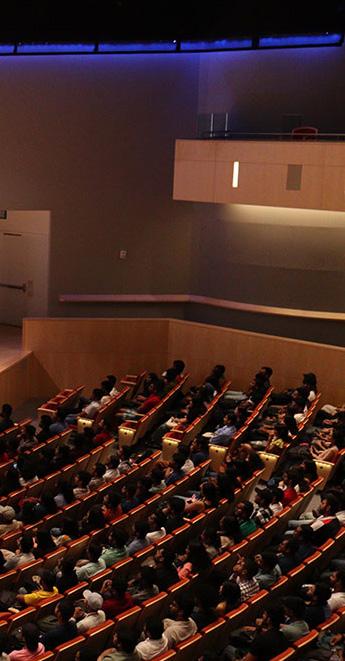
India, Bangladesh, China, Vietnam, and beyond, offer opportunities for cultural exchange and mutual understanding. Additionally, clubs focusing on first-generation college students and affinity groups like Women in Technology and Black Professional Organizations provide avenues for students to connect with peers who share their experiences and interests.
Located conveniently near major highways and with access to public transportation, the campus ensures that students can easily commute from surrounding areas like Arlington, Irving, and Mesquite. Moreover, with plans for a new rail station at the north end of campus in the next two years, transportation to and from campus will become even more accessible, further enhancing the school’s appeal to students from diverse geographic backgrounds.
The Distinctive Features of Jindal School Degrees
Within each degree program offered by the Naveen Jindal School of Management, there

65 Higher Education Digest April 2024
exist distinctive features that elevate graduates to the forefront of their respective fields:
Curriculum Flexibility: Jindal School degrees are characterized by a remarkable degree of curriculum flexibility. This empowers students to tailor their academic pursuits in alignment with their career aspirations, whether they are pursuing undergraduate studies, an MBA, or specialized programs such as Management Information Systems. This flexibility ensures
that each student’s educational journey is uniquely suited to their individual interests and professional objectives.
Access to Thought-Leaders: At the Jindal School, students enjoy unparalleled access to top thought-leaders within their academic disciplines. With a faculty composed of renowned scholars and industry experts, students have the opportunity to engage directly with leading minds in their fields. This exposure

66 Higher Education Digest April 2024

provides invaluable insights and perspectives, enriching the learning experience and preparing students for the challenges they will encounter in their careers.
Rigorous Education: Rigor is a defining characteristic of education at the Jindal School. Through rigorous coursework and challenging classes, students are equipped with the knowledge, skills, and analytical abilities necessary to excel in their chosen fields. This rigorous academic environment ensures that graduates are well-prepared to navigate dynamic and fast-paced professional landscapes with confidence and competence.
Vibrant Community Engagement: The Jindal School fosters a vibrant community where students can engage with a diverse range of peers and opportunities. Whether through participation in student clubs, involvement in professional organizations, embarking on international study trips, or accessing outstanding career preparation resources, students find avenues for personal and professional growth. These experiences not only broaden their horizons but also cultivate a sense of belonging and camaraderie among peers.
Meaningful Research Opportunities: Research lies at the heart of the academic experience at the Jindal School. Students are encouraged to explore their intellectual curiosity and contribute to knowledge creation through meaningful research endeavors. From undergraduate research projects to graduatelevel thesis work, students have the opportunity to delve into cutting-edge topics and make a tangible impact in their fields of study.
Financial Support: Recognizing and rewarding academic excellence, the Jindal School provides financial support to deserving
67 Higher Education Digest April 2024
students at every level of study. Scholarships, fellowships, and other forms of financial aid ensure that students have the resources they need to pursue their educational goals without financial constraints. This commitment to supporting students further underscores the school’s dedication to fostering a diverse and inclusive learning environment.
Additionally, the Jindal School has forged deep connections with local and international corporations and organizations. These partnerships, facilitated through the Dean’s Advisory Council and corporate councils associated with various degree programs, provide students with invaluable opportunities for internships, networking, and real-world learning experiences. By leveraging these relationships, the Jindal School enhances the relevance and impact of its academic programs, ensuring that graduates are well-equipped to thrive in today’s globalized and interconnected world.
Investing in Student Success
At the Naveen Jindal School of Management, fostering student success goes beyond the classroom. Recognizing the importance of financial support and practical experience, the school offers a multitude of scholarships and internship opportunities to its top-performing students.
The Jindal School takes pride in offering hundreds of undergraduate, graduate, and doctoral scholarships to deserving students. The application process is streamlined and straightforward, consisting of just two simple steps for consideration. With over 100 scholarships available, students have access to a wide range of opportunities, including
degree-specific, merit-based, and needbased scholarships, or combinations thereof. Additionally, students may also be eligible for select scholarships offered by UT Dallas, further expanding the avenues for financial assistance.
The Jindal School’s Career Management Center serves as the primary resource for internship opportunities, connecting students with companies seeking talented interns. From local financial institutions to global players in the supply chain industry, a diverse array of internship positions are regularly available to Jindal School students. Through on-campus recruitment events and networking opportunities, students have the chance to secure internships that provide invaluable realworld experience and lay the foundation for future career success.
Celebrating the Success
The alumni of the Naveen Jindal School of Management showcase the transformative impact of its programs on professional achievements. Laura Albright, a member of the Class of 2016 and currently serving as a Management Consulting Lead Analyst at RealFoundations, attests to the profound influence of her Jindal School experience. Reflecting on her journey, she emphasizes the program’s role in equipping her with the necessary tools to transition into a rewarding career in a new industry. From the immersive in-class experience to the supportive community of alumni and the rigorous curriculum, Laura credits the Jindal School for not only fostering her professional growth but also cultivating lasting friendships among like-minded peers. Her message resonates with aspiring professionals, highlighting the
68 Higher Education Digest April 2024
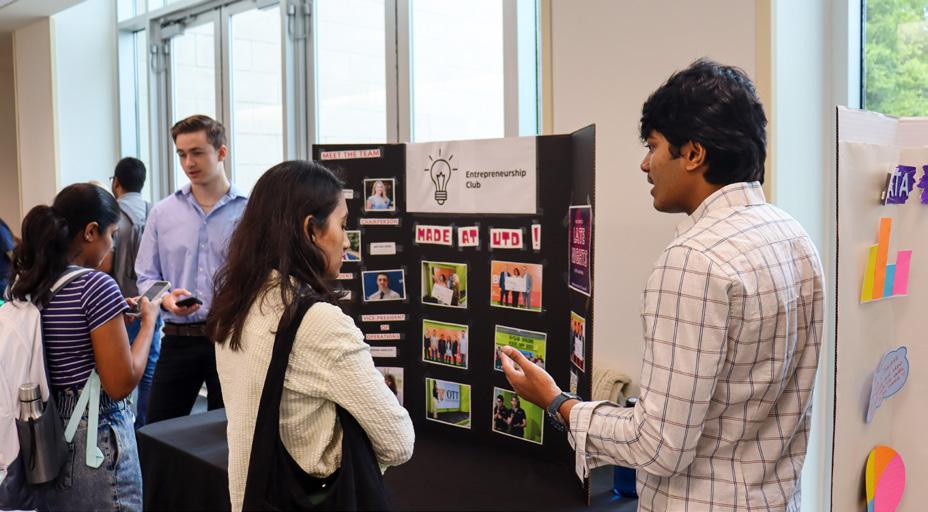
inclusive and empowering environment that defines the Jindal School experience.
Similarly, Djidan Gbamnan, a recent graduate from the Class of 2024 with a Bachelor’s degree in Supply Chain Management, shares his perspective on the significance of his academic journey at the Jindal School. Drawing upon six years of experience in the supply chain industry, Djidan underscores the natural progression of pursuing a degree at The University of Texas at Dallas to enhance his skills and expertise. Through the Supply Chain Management and Analytics program, Djidan has honed his analytical prowess, deepened his understanding of business operations, and expanded his knowledge across diverse areas such as global logistics and integrated supply chain management. Djidan’s narrative exemplifies the alignment between academic pursuits and professional aspirations, highlighting the pivotal role of the Jindal School in shaping future industry leaders.
Beyond individual success stories, the Jindal School fosters a strong sense of community and engagement among its alumni through various initiatives and events. The biannual magazine, Management, serves as a platform for alumni
to stay connected and informed about the latest developments within the school and the broader business landscape. Additionally, annual events like the Jindal School Scholarship Breakfast, Alumni Gala, and Homecoming provide opportunities for alumni to reconnect with their alma mater and share their insights and experiences with current students.
Moreover, the Jindal School’s commitment to alumni outreach extends beyond campus borders through initiatives such as Comets in the Community. This traveling alumni outreach program facilitates connections and networking opportunities for alumni across the nation and beyond, reinforcing the bonds of camaraderie and shared experiences that define the Jindal School community. Alumni interested in organizing events in their cities are encouraged to reach out to the UTD Alumni Office, further enhancing the reach and impact of the school’s alumni network.
Through the stories of Laura, Djidan, and countless other alumni, the Jindal School celebrates a legacy of excellence, innovation, and community that continues to inspire and empower future generations of leaders in the global business landscape.
69 Higher Education Digest April 2024
Unleashing the Potential of Educational Teams: The Art of Coaching
IDr. Caroline Holden, Owner of Caroline Holden Consultancy Ltd INDUSTRY PERSPECTIVE
n the fast-paced world of education, where students’ needs are ever-evolving, the role of an educational leader is more vital than ever. Managing teams in the educational landscape is a multifaceted challenge that requires finesse, empathy, and a deep understanding of how to bring out the best in your team. In this article, we will delve into the
art of coaching, exploring techniques like open questioning, active listening, and reflection that can transform the way you lead your educational team to success.
The Power of Open Questions
As an educational leader, you understand that effective communication is the bedrock of a
When you actively listen, you signal to your team members that their voices matter, their ideas are valued, and their concerns are heard
70 Higher Education Digest April 2024
Dr. Caroline Holden has over twenty-five years of experience in higher education. She holds a Doctorate in Higher Education, a Level 7 qualification from the Institute of Leadership & Management in Coaching & Mentoring, an MSc in Educational Management, a Cambridge Diploma in English Language Teaching to Adults (DELTA), and a PRINCE 2 Project Management Practitioner qualification. She is also recognized as a Senior Fellow of the Higher Education Academy. Caroline’s broad experience includes working in Saudi Arabia and Bahrain establishing new programmes and departments in a range of higher educational institutions, including a new medical university. She has also published in international journals on the student journey, the firstyear experience, and improving student success rates. Caroline now works as an Educational Consultant working on a range of exciting projects in the UAE and the wider MENA region. She is passionate about coaching for higher education and the impact this achieves for academics, administrators, and students through institutional coaching models, coaching training, and team and individual coaching interventions.

Education
thriving learning environment. Open questions, those that cannot be answered with a simple “yes” or “no,” are your gateway to fostering meaningful conversations. They invite your team members to explore, think critically, and engage in insightful dialogues.
Imagine you’re facing a complex challenge within your team. Instead of issuing directives, you turn to your team and ask, “What strategies do you believe would be most effective in addressing this challenge?” This open question encourages diverse perspectives and empowers your team to be part of the problemsolving process.
The Art of Active Listening
Active listening is akin to a magic wand in the realm of team management. It involves not just hearing words but fully comprehending what others are saying. When you actively listen, you signal to your team members that their voices matter, their ideas are valued, and their concerns are heard.
Picture yourself in a team meeting, where a team member is sharing their thoughts on a proposed project. As they speak, you maintain eye contact, nodding in acknowledgment, and occasionally offering reflective statements like, “I hear what you’re saying, and it sounds like you have some reservations about this approach.” This active listening technique creates an atmosphere of trust and openness, where team members are encouraged to express themselves freely.
The Power of Reflection
In the bustling world of education, pausing for reflection may seem like a luxury. However, it’s
a crucial practice for both individual growth and team development. Reflection invites your team members to examine their experiences, thoughts, and actions, leading to valuable insights and continuous improvement.
Imagine your team has just completed a challenging project. Instead of rushing to the next task, you gather your team for a reflective session. You ask questions like, “What went well during this project? What could have been improved? What lessons have we learned?” This simple act of reflection transforms past experiences into stepping stones for future success.
A Real-World Application
To bring these coaching techniques to life, let’s explore a real-world scenario. You’re leading an educational team tasked with implementing a new teaching methodology. The team is experiencing challenges in adapting to this change.
You begin by posing an open question during a team meeting: “What aspects of the new teaching methodology do you find most challenging, and how can we address these challenges together?” This question encourages team members to express their concerns openly.
As team members share their thoughts, you actively listen, demonstrating empathy and understanding. You paraphrase their concerns and acknowledge their emotions, creating a safe space for open dialogue.
Following the discussion, you encourage team members to engage in reflection. Each team member takes a moment to jot down their reflections on the challenges and potential solutions. This reflection process fosters selfawareness and personal growth.
72 Higher Education Digest April 2024
Effective educational leadership is not solely about achieving academic goals but also about fostering personal and professional growth within your team
Based on these reflections, the team collectively sets SMART (Specific, Measurable, Achievable, Relevant, Time-bound) goals for improving their adaptation to the new teaching methodology. This collaborative goal-setting empowers team members to take ownership of the change process.
You continue to follow up with the team, assessing progress, celebrating achievements, and addressing new challenges as they arise. Your open questions, active listening, and reflection have transformed the team’s dynamics, making them more resilient and adaptive in the face of change.
Conclusion
Effective educational leadership is not solely about achieving academic goals but also about fostering personal and professional growth within your team. The art of coaching, with its techniques of open questioning, active listening, and reflection, can help you unlock the untapped potential of your educational team. By incorporating these techniques into your leadership style, you create an environment where team members are heard, valued, and motivated to reach new heights in their educational journey.
73 Higher Education Digest April 2024
AI in Education, Balancing Innovation with Ethics
Dr. Mario Herane, Vice President of Global Affairs and Development, Universidad Mayor
Dr. Mario Herane is an accomplished leader in higher education, with a notable career spanning over 17 years in educational leadership, EdTech, technology management and operational excellence. Currently serving as the Vice President of Global Affairs and Development at Universidad Mayor in Chile and the U.S., he has spearheaded significant initiatives of institutional development across the globe. Dr. Herane’s academic credentials include a Doctorate in Business Administration from the University of Liverpool, an MBA for the University of Florida, and a Master’s in Finance for Florida International University, supplemented by professional development at renowned institutions like Harvard Kennedy School, MIT, Hasso Plattner Institute, and Stanford University. His experience also encompasses roles such as the Director of Online Learning at Universidad Mayor and Founder of Nexus University. Dr. Herane’s work is distinguished by his commitment to leveraging technology and strategic planning in creating innovative and inclusive educational environments.
The introduction of Artificial Intelligence (AI) in higher education marks a significant paradigm shift, one that promises to redefine traditional learning methodologies. This technological advancement is as exciting
as it is daunting. AI offers tremendous opportunities for enhancing and personalizing educational experiences, but it also brings with it ethical complexities and regulatory challenges. This scenario, where technology advances more rapidly than corresponding
74 Higher Education Digest April 2024 ACADEMIC VIEW

Like many technologies before it, AI’s benefits have led to its widespread adoption, necessitating societal, regulatory, and legal adaptations post-integration
75 Higher Education Digest April 2024

As AI becomes more prevalent in higher education, there’s a risk of widening the gap between those with access to cuttingedge technology and those without
Higher Education Digest April 2024
regulations and societal norms, is not unique to AI and reflects a common pattern in the evolution of disruptive technologies.
Take the rise of social media platforms like Facebook, Twitter, and Instagram, for example. These platforms transformed communication and information sharing, quickly becoming integral to daily life. However, the rapidity of their growth and extensive data accumulation outpaced the development of data privacy laws and regulatory oversight. It wasn’t until these platforms were deeply entrenched in society that significant attention was given to issues of data privacy, misinformation, and ethical implications.
Similarly, the advent of ride-sharing services such as Uber and Lyft brought about a revolution in urban transportation. Their swift expansion often exceeded the grasp of existing regulatory frameworks, sparking conflicts with traditional taxi services and debates over labor rights, passenger safety, and urban traffic management.
The field of drone technology, initially a military tool, rapidly expanded to commercial and recreational uses. Its widespread adoption outpaced the establishment of comprehensive regulations, leading to concerns about privacy, airspace safety, and noise pollution.
Genetic engineering, and specifically CRISPR technology, is another area where rapid technological advances have outstripped ethical and regulatory frameworks. The potential for gene editing in human embryos and the concept of ‘designer babies’ have sparked intense ethical debates and calls for international regulatory standards.
In each of these instances, the speed of technological innovation has moved faster
than society’s ability to fully understand and regulate it. This pattern is now evident with AI in education, where the technology’s rapid development precedes the establishment of comprehensive ethical guidelines and regulations. This lag presents a significant challenge, requiring educators, policymakers, and technologists to work collaboratively to ensure that AI is integrated into education responsibly and ethically. However, like many technologies before it, AI’s benefits have led to its widespread adoption, necessitating societal, regulatory, and legal adaptations post-integration.
The key lesson from these historical parallels is the necessity for proactive engagement with emerging technologies. Anticipating and addressing societal, ethical, and legal implications as these technologies emerge is essential, rather than reacting after their widespread adoption. For AI in education, this means establishing ethical frameworks, designing inclusive and unbiased systems, and fostering collaborative dialogues among stakeholders. This proactive approach will ensure that AI not only enhances educational outcomes but does so in a way that respects the rights and dignity of all learners, setting a precedent for responsible innovation in the field of education.
From an ethical standpoint, educational institutions must ensure that AI systems uphold the highest data protection standards. Transparency in data usage and giving students control over their data are vital for maintaining trust and integrity in the AI-enabled educational landscape. Accountability and transparency in AI decision-making processes are essential.
77 Higher Education Digest April 2024
Just as calculators transitioned from being perceived as a threat to the rigor of mathematical education to becoming an indispensable tool, AI, too, has the potential to evolve into a valuable asset for students and their future professions
Institutions must establish clear policies on how AI-driven decisions are made and communicated, ensuring that AI is not an enigmatic, unaccountable force in education but a comprehensible and scrutinizable tool.
The digital divide is an equally important ethical consideration. As AI becomes more prevalent in higher education, there’s a risk of widening the gap between those with access to cutting-edge technology and those without. Institutions need to ensure equitable access to AI tools and resources. This might involve investing in infrastructure that supports widespread access to AI educational tools, providing training for students and educators, and developing partnerships to support underresourced areas.
Professional development for educators is another critical action point. As AI tools become more integrated into the educational process, educators must be well-versed in these technologies. Training programs focusing on the ethical use of AI, understanding its capabilities and limitations, and strategies for effectively integrating AI tools into the curriculum are
essential. Training faculty will empower them to apply this technology in the classroom and impart good practices to students.
In closing, the integration of AI in higher education is a work in progress. Drawing upon lessons from the past, such as the introduction of calculators into the classroom, we understand that adopting new technologies in educational settings is a journey of adaptation, understanding, and refinement. Just as calculators transitioned from being perceived as a threat to the rigor of mathematical education to becoming an indispensable tool, AI, too, has the potential to evolve into a valuable asset for students and their future professions. The key is to assess the implications of new technologies carefully and integrate them methodically into the educational fabric. By doing so, we can ensure that AI becomes not just a sophisticated tool in higher education but also a catalyst for enriching the learning experience and equipping students with the skills and knowledge needed to excel in their future careers.
78 Higher Education Digest April 2024
















 Sarath Shyam
Sarath Shyam





































































